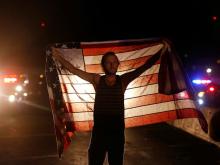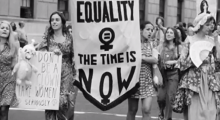anger

SEVERAL OF THIS month’s lectionary readings deal with the tensions of navigating wrongdoing, judgment, vengeance, and forgiveness. They call readers to forgive — and forgive again: not just once, twice, or seven times, but at least 77 times and counting (see Matthew 18:22).
These texts have been used throughout history to trap people in positions of disempowerment, abuse, and enslavement. Consider, for example, how victims of intimate partner violence have been pressured to forgive and return to their abusers, who then proceed to hurt them again. Or how entire marginalized communities are expected to “get over it,” whether that is the colonization of Turtle Island, enslavement, or generations of misogynist, queer- and transphobic policies, laws, and violence. In light of the rampant misuse of these texts, we’re right to be wary of biblical interpretations for how to handle conflict that reinforce domination. The texts tend not to deal directly with inherent interpersonal and structural power dynamics. We must do that work ourselves. Any of us preaching the lectionary this month must also be careful.
Attending to the power dynamics of these passages doesn’t mean we dismiss them as useless. Rather, such attention helps us discern how these texts invite and bear witness to God’s presence in processes of interpersonal, intergenerational, and even international healing. They call us to attend to what our own pain has to teach us and to seek hope through community life. And they promise that throughout our attending, God will abide — waiting patiently to see us through.

I like my anger. I stoke it
like a fire, tend to it
with tender hands, cup
a hand ’round as I
blow to fan the flames

Perhaps now, more than ever, Christians need to redefine their relationship to rage — particularly women’s rage. The nation watched Dr. Christine Ford testify about her alleged assault while maintaining a gracious demeanor whereas Brett Kavanaugh was allowed to rant about his supposed mistreatment. This double standard stems from centuries of social conditioning, as well as a rather sexist interpretation of the Bible that argues women are to be silent and submissive.

I am upset by the results of the election, and I am particularly saddened that 81 percent of white American evangelicals got into bed with a monster on Nov. 8. But I am also encouraged and have not lost hope.
Here’s why:
Around 11:15 p.m. Tuesday, my 15-year-old daughter, frustrated by all she was seeing on the television, stormed out of the room and announced: “Dad, I am going to bed. I am embarrassed for my country.”

I’ve heard it said that you don’t know true love until you hold your baby for the first time. I hate that, for so many reasons. And I hate whoever has said it to me or anyone else. Hate it.
This may come as a shock, but I’ve got the slightest anger issue. It’s more accurate to say I didn’t know true anger until I became a mother.
There’s the daily anger, like slaving away in the kitchen for hours only to have people gag and demand crunchy toast and cookies to eat, while they scream and scratch their sister and slip on spilled water and cry for hours. There’s the hourly anger, like the struggle between wanting to check out and check e-mail in the face of little people wanting to play or needing to be disciplined.

We think it's wrong for a woman, much less a mother, to be angry. And so when anger inevitably, righteously, hits us — with its cousin fatigue and its brother frustration — we don't know what to do except to bury it beneath a smile that gets thinner and weaker as the day winds on.
We all get angry, though. It is a function of being human, and I daresay without anger we would never have won women the right to vote, school desegregation, or any other host of advances that came about when people got righteously angry and unleashed the power of justice and the Holy Spirit.
So be angry when you are angry. The Bible says so. Do not be ashamed to say, in the moment, "This is not right. I'm angry."

Bras weren’t the only things the second-wave feminists burned in the ‘60s. But that’s all I learned about the movement in school and casual conversation (on the rare occasions when feminist movements were brought up). The documentary, She’s Beautiful When She’s Angry, fills in what our education system and historical imaginations leave out.
Second-wave feminists also burned oppressive patriarchy, definitions of feminine beauty, and, most poignant to me, their hard-earned diplomas. They literally set fire to bachelors degrees, masters degrees, and PhD certificates. An activist in the film explained, "We had graduated and learned nothing about women."
This documentary shows us what the textbooks didn’t and still don’t show often enough — the early, angry, undoubtedly beautiful grassroots radicals.
Of course, not all anger is beautiful. Some anger is abusive, relentless, and uncontrollable. I noticed three types of anger in the documentary — one beautiful, and two problematic.

LOVE. THAT'S WHAT moves mountains. That’s what the inimitable Dr. Maya Angelou shared with Oprah Winfrey in an interview a year before Angelou’s passing on May 28, 2014, at the age of 86.
In the days following her death, tributes blanketed the television and internet. Perhaps the greatest came on Sunday evening, June 1, as Oprah Winfrey aired a series of exclusive interviews with Dr. Angelou. Thus, the prophet spoke from the grave and this is what she said: “Love moves mountains.”
Jesus said faith moves mountains—faith the size of a mustard seed (Matthew 17:20). Did Dr. Maya Angelou dare to contradict Jesus? The poet/prophet says love. Jesus said faith. Which is it? Perhaps both.
People of faith know—they have witnessed it. Faith does move mountains. But they also know this: Faith’s power can lay dormant until it’s set ablaze by love. Perhaps only love has the power to fortify faith enough to make the earth quake.
Anger can shake earth, but it cannot move it. Rage can break earth, but it cannot move it. What if faith the size of a mustard seed requires the force of love to move the mountain? If that is the case, we are left with one haunting question: Why have we seen so few mountains move in our lifetime?
AMID WORRIES about a new Cold War, of standoffs with old enemies and confrontations with new ones, Harvard professor Elaine Scarry’s latest book is a chilling reminder of the doom our presidentially controlled nuclear arsenal can unleash upon the world. Early on, she reminds us that President Nixon told reporters, “I can get on the telephone and in 25 minutes 70 million people will be dead.”
This boast illustrates Scarry’s thesis: We live in a thermonuclear monarchy, where one person—the U.S. president—can destroy the world. Nuclear doom is an accident waiting to happen, and she reviews a number of barely publicized near misses.
But she sees a solution at hand—the U.S. Constitution, specifically both Article I, Section 8, which says that Congress alone can declare war, and the Second Amendment. The text of the latter reads: “A well regulated militia being necessary to the security of a free state, the right of the people to keep and bear arms shall not be infringed.” (Emphasis added.) Scarry argues that the amendment mandates a second level of citizen consent to war, a further brake to executive power, even after Congress has given its approval—that the writers of the Constitution intended that before the U.S. engaged in any war the people would have to consent to join a militia, a form of collective participation in the decision for war. According to Scarry, our out-of-ratio nuclear weapons stockpile, ready to launch at the command of a single person, has negated the Constitution-mandated chain of accountability and decision-making and is therefore illegal.

While Angry Birds has produced a massive monetary windfall over the past few years, the game has endured a significant level of controversy, especially in recent months. In January it was revealed that Angry Birds was a “leaky application,” as it was used by the National Security Agency and Government Communications Headquarters to collect private data about its users, such as residential location and sexual orientation. According to numerous online and print media investigative publications, the private user information of Angry Birds users was leaked through the application itself and collected by government authorities and private retailers for detailed analysis (under the stated purpose of research and national security). In the midst of it all, the incriminating evidence revealed that Angry Birds was a massive privacy hazard, as the Rovio Entertainment application allows the intimate details of its user identities to be stolen and even sold.
WHEN CHIEF MASTER Sergeant Harry Marsters returned in 2008 from his time in Iraq, he knew something wasn’t right. At 54, the 32-year veteran of the Air Force—with 27 years full time in the military and the remainder as a reservist with the Air National Guard—felt that as one of the “older folks” he knew what to expect upon return from his assignment with the communications squad at the Kirkuk Regional Air Base in northern Iraq.
Marsters’ squadron trained Iraqi forces in the operation and maintenance of aerial surveillance equipment on the base, which housed 1,000 Air Force and 2,500 Army troops. As first sergeant he acted as a liaison to the Air Force troops and ensured the well-being of those stationed there. It was a job he relished, pouring care into building connections with the airmen and women, spending time with the chaplains, and coordinating recreation and morale-building activities.
Though Air Force personnel never left the base, they were subjected to the ever-present threat of randomly timed mortar rounds launched by insurgents. They also took part in nighttime “patriot details” in which Air Force personnel and soldiers lined the base’s runway as the bodies of fallen soldiers were loaded onto planes for transport back to the United States. But Marsters says he was most upset by what he felt was harsh treatment of the Iraqi nationals who came to work on the base.
“They were treated like criminals,” he says of the extensive searches and intimidation Iraqis received when going through base security. “Everyone in Iraq is not evil, bad, and nasty. It’s a very small group of people who are raising hell and trying to hurt the country. The average person is just trying to make some money and take care of his or her family.”

EXECUTE: TO ENACT OR DO. Having grown up in inner-city Chicago, I have fond memories of red fire hydrants, swinging jump ropes, and church robes. During summer, the fire department would open the hydrants. Parents granted the petitions of children to run through the streams of water, soaking our clothes and cooling our backs. And while I never achieved the rhythmic agility to jump Double Dutch, I loved to recite the rhymes, which eventually helped me gain a verbal dexterity like that of my pastor. I wanted one day to have a robe like hers—one that signaled that the words I spoke revealed the reign of God.
Turn the clock back. Some children would hold very different memories of fire hydrants, ropes, and robes. In Birmingham, Ala., in1963, the force of the water injured petitioners for freedom. During the American Revolution, a Virginia justice of the peace named Charles Lynch ordered extralegal punishment for Loyalists to the Crown. The swinging rope became the tool of mob violence. And the “hooded ones” continue to use the label of “Christian” to make a mockery of the vestments of clergy.
Fire hydrants. Ropes. Robes. Execute: to eliminate or kill. Meaning conveyed to the hearer may not at all resemble the intention of the speaker. Often communication requires suspension of what we think in order to listen to the context from which the speaker shares. Reading is no easier a task. Sometimes the same letters forming the same word present entirely different meanings. Justice executed. What does it mean?
The context for the next four weeks exposes what the Lord’s justice requires.

DURING MY EARLY years of sobriety, I spent most Monday nights in a smoke-filled parish hall with some friends who were also sober alcoholics, drinking bad coffee. Pictures of the Virgin Mary looked down on us, as prayer and despair and cigarette smoke and hope rose to the ceiling. We were a cranky bunch whose lives were in various states of repair. There was Candace, a suburban housewife who was high on heroin for her debutante ball; Stan the depressive poet, self-deprecating and soulful; and Bob the retired lawyer who had been sober since before Jesus was born, but for some reason still looked a little bit homeless.
We talked about God and anger, resentment and forgiveness—all punctuated with profanity. We weren’t a ship of fools so much as a rowboat of idiots. A little rowing team, paddling furiously, sometimes for each other, sometimes for ourselves; and when one of us jumped ship, we’d all have to paddle harder.
In 1992, when I started hanging out with the “rowing team,” as I began to call them, I was working at a downtown club as a standup comic. I was broken and trying to become fixed and only a few months sober. I couldn’t afford therapy, so being paid to be caustic and cynical on stage seemed the next best thing. Plus, I’m funny when I’m miserable.
This isn’t exactly uncommon. If you were to gather all the world’s comics and then remove all the alcoholics, cocaine addicts, and manic depressives you’d have left ... well ... Carrot Top, basically. There’s something about courting the darkness that makes some people see the truth in raw, twisted ways, as though they were shining a black light on life to illuminate the absurdity of it all. Comics tell a truth you can see only from the underside of the psyche.
The most precious place on Earth for me is a camp on a lake in the Adirondack Mountains of New York. During the next century, climate change will chase northward things that I cherish. Spruce, tamaracks, sugar maples, balsam fir, moose, mink, and loons will no longer grace the shores and waters of that lake. Like most people in northern climes, I see the changes happening already. I have to fight hard against despair, for my personal losses, yes, but also for the universality and injustice of the calamity, which already affects so many of the poor and innocent.
WHY IS IT so hard for people to respond effectively to the reality of climate change?
Changing people’s minds—with facts, tables, and predictions—has proven extremely difficult. Even showing people the miraculous beauty of the planet alongside the predicted losses is not working. Guilt, anxiety, and anger can be motivating forces, but they have debilitating side effects: They are all soul-destroying.
So I wonder about our hearts. Have we ignored our emotional and spiritual connections to the planet? Could the noise swirling around climate change—science, politics, media blitzes, as well as the weather disasters themselves—drown out the voice of a loss so profound that it rests unnamed in our souls? Could our breaking hearts be part of the reason we are immobilized?
In the 1960s, Rachel Carson’s image of a “silent spring” due to the proliferation of pesticides was as heartrending as it was controversial. Carson was ridiculed, her predictions dismissed. The corporate world paid millions to have her silenced. But eventually the love of bird songs won out. People read Carson’s book, grieved at the prospect of a silent spring, spoke up, and insisted the chemical-company-supported politicians ban DDT.

I woke up this morning, like everyone else, to the news of a shootout with one suspect in the Boston Marathon bombing and the ongoing manhunt for a second brother. Like many others, I’ve heard lots of misinformation over the past few days about whether officials did or didn’t have a suspect, whether they did or didn’t have them in custody, and so on.
“I heard someone dropped a bomb on Boston,” said Mattias, my 9-year-old son, over breakfast while I scrolled through the breaking news reports.
“Not exactly,” I said. “It was two guys. Two brothers who came from [another country] to go to college at MIT.” They put homemade bombs in and around trashcans by the finish line of the marathon.”
“Why?” he asked.
“I really don’t know.”
“Maybe they were angry about something, and they didn’t know how to talk about their feelings.”
“Maybe so,” I nodded.
“Did they hurt people?”

It seems lately that the Republican party is painting itself into an angry corner that it can’t find its way out of.
Rush Limbaugh’s recent loose-lipped “slut” comment is a clarion call to his significant conservative base to forge ahead in a direction that leads nowhere good. Basically, he cast negative, sexually charged aspersions at Sandra Fluke, a college student who publicly advocated for health insurance that included birth control.
As this piece in the Christian Science Monitor notes, his comments — and the greater sentiment they reflect — point to a sexual double-standard among many social conservatives. But that isn’t what is tripping up the GOP right now.
Anger is their Achilles heel.
There has been a lot of anger levied at the very wealthy since the Occupy movement began back in September. There is no doubt that much of this anger is justified – righteous indignation, if you will.
The ways that people have become extremely wealthy have often been corrupt or immoral, whether or not they are technically "legal." Part of the reason that the Occupy movement sprang up was because people felt that there were different rules for "us and them." People who lost millions of dollars in what was effectively high-stakes gambling were pardoned with little more than a slap on the wrist, while regular families lost everything in a crisis they had no hand in.
As I say, there has been, and still is, much anger. But out of that anger must come something new, something tangible and real.
Late Friday afternoon, UC Davis campus minister, the Rev. Kristin Stoneking, was in the car driving with her family from Davis to the American Academy of Religion gathering in San Francisco when she received a phone call from a campus administrator. Katehi was "trapped" inside her office at the university administration building, where a large crowd of protesters had gathered outside, flanking both sides of the sidewalk in front of the building's entrance. The chancellor was afraid to leave on her own and asked Stoneking to come mediate her exit with students.
Stoneking was running late, having missed a few of the AAR's sessions already, and was reluctant to heed the call. She called one of the students involved in organizing the Occupy protests on campus and learned that, "students were surrounding the building but had committed to a peaceful, silent exit for those inside and had created a clear walkway to the street." So she turned the car around and drove back to the university.
"Why did I walk the Chancellor to her car? Because I believe in the humanity of all persons," Stoneking writes. "Because I believe that people should be assisted when they are afraid. Because I believe that in showing compassion we embrace a nonviolent way of life that emanates to those whom we refuse to see as enemies and in turn leads to the change that we all seek. I am well aware that my actions were looked on with suspicion by some tonight, but I trust that those seeking a nonviolent solution will know that 'just means lead to just ends' and my actions offered dignity not harm."
So what makes the Troy Davis case stand out from most other death penalty cases?
Serious doubt.
Not about whether the death penalty is the appropriate punishment for Davis or has been correctly applied.
The doubt raised in Davis' case is whether he committed the crime at all. And those questions about his guilt have prompted hundreds of thousands of people to raise their voices in opposition to his execution, most recently former FBI Director William Sessions who, in an op-ed in the Atlanta Journal-Constitution Friday, called on the Georgia Board of Pardons and Paroles to commute Davis' sentence to life in prison.